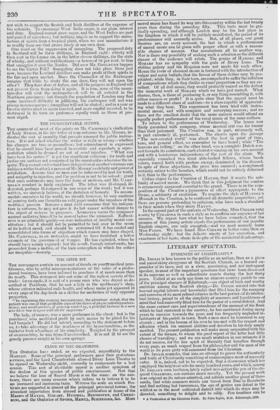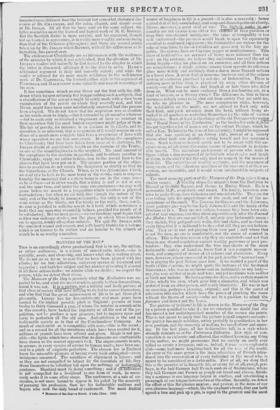LITERARY SPECTATOR.
EVIDENCES OF CHRISTIANITY.*
DR. INGLIS is less known to the public as an author, than as a pious and painstaking clergyman of the Scottish Church, as a learned ex- pounder of its laws, and as a clear, convincing, and not ineloquent speaker, in most of the important questions that have been discussed in its supreme as well as subordinate courts during the last thirty years. Called at an early age from an obscure country parish to one of the principal charges of Edinburgh,—an object of high and worthy ambition among the Scottish clergy,—Dr. INoeis carried into that learned capital talents and knowledge that fitted him for the company and converse of its most refined citizens in the best periods of its intellec- tual history. joined to all the simplicity of manners and humbleness of mind that had eminently fitted him for the pastor of a rural district. And the same earnest care and superintendence of the meanest of his flock which he had exercised in the country, he has continued during many years to exercise towards the poor, and too frequently neglected in- habitants of his parish in town. Such a man must be honoured in any church ; and in the bosom of his own he has met with the respect and affection which his eminent abilities and devotion to his duty amply merited.. The present publication will make many acquainted with the extent of the former, to whom the good report -of the latter had little chance of travelling ; and we are much mistaken in our estimate if it do not receive, for the fine spirit of liberality that breathes through every page, as much respect from the philosopher and the man of the world as its pure piety will command from the Christian. Dr. INGLIS remarks, that into an attempt to prove the authenticity and truth of Christianity something of commonplace must of necessity enter. It is, indeed, not to be expected, that a discussion which has employed the brightest wits for many hundred years, and which, among. Dr. INoeis's own brethren, lately called into action the pen of the do- quent CHALMERS, can contain much novelty. Yet the present work is as original as its nature admitted, and affords another proof of thou- sands, that while common minds can travel from Dan to Beersheba and find nothing but barrenness, the eye of genius. can detect in the wildest as in the most cultivated district into which its steps may be directed, something to delight and to edify. Few treatises can be * A Vindication of the Christian Faith. By John Inglis, 3),13. Edinburgh, 1830. imagined more different than the brilliant but somewhat rhetorical dis- course of Dr. CHALMERS, and the calm, elegant, and simple essay of Dr. INGLIS. Of all that we have read on the same subject, the latter resembles most the learned and logical work of M. C. l3orsoseer. But the Scottish divine is more concise, and his argument, though not so learned in appearance, is in reality more weighty and convincing than that of the Genevese philosopher ; and there are several points taken up by Dr. INGLIS which BONNET, with all his diffuseness of il- lustration, has passed over The evidences of Christianity are sa interwoven with the evidences of the miracles by which it was established, that the attention of Dr. laams's readers will naturally be first turned to the chapter in which the latter is dismissed, although it be the third in order. HOME'S celebrated ftegument is tidily and honestly stated ; and while the reader is referred for its more ample refutation to the well-known work of Dr. CAMPBE LL, t4 learned author adds to the argument of CAMPBELL and MACKNIGHT some valuable and cogent reasonings of his own.
It has sometimes. struck us (we throw out the hint with the diffi- (knee which laymen naturally feel in approaching such a subject), that a classification of the miracles might be safely made with a view to an examination of the proofs on which they severally rest, and that Masa might have been more satisfactorily answered had this process been adopted. We do not know that his scepticism was so absolute as his words seem to imply,—that it extended to all miracles whatever —hut to such only as involved a suspension of laws so constant in their operation that the most limited experience might judge of them. The law of gravity, for instance, is so obvious in its effects, and its operation is so universal, that a suspension ofit would require an evi- dence of a much more complete kind than a suspension of laws with whose operation we are less conversant. In noticing the exceptions to Christianity that have been taken from some of its doctrines, Dr. Lloms dwells at considerable length on the doctrine of the Trinity, as one of the stumblingblocks to the sceptical. No small amount of the except ions to the doctrine in question, and to others peculiar to Christianity, apply, we rather believe, less to the record than to the glosses that have been put on it. The greater portion of the objec- tors to revelal ion do not search the Scriptures so strictly as they do the Catechisms of the Church. When, as in the Athanasian Creed, we read (thr to look to the mere tenor of the words, such is unques- tionably the meaning) that a certain being is one in the same sense
as he is three—or in other words, that a thing is and is not at one and the same time, and under the same circumstances—we may well pause before we assent to a proposition which involves a physical
contradiction ; but when we are told, that hough the nature of the unity and of the trinity be incomprehensible, the unity is not of the
same nature as the trinity, nor the trinity as the unity, then, surely,
no man is justified in refusing assent to a book which announces a truth that any man may reasonably believe, provided the proofs of it be satistactoiy. But we must pat:sea—we are touching upon topics that
neither our ordinary studies, nor the place in which these remarks are to appear, render altogether suitable. We quit Dr. INGLIS with the sincerest regard and respect, and with hearty thanks for a volume which is an honour to its author and an honour to the church of which he is so worthy a member.



















 Previous page
Previous page